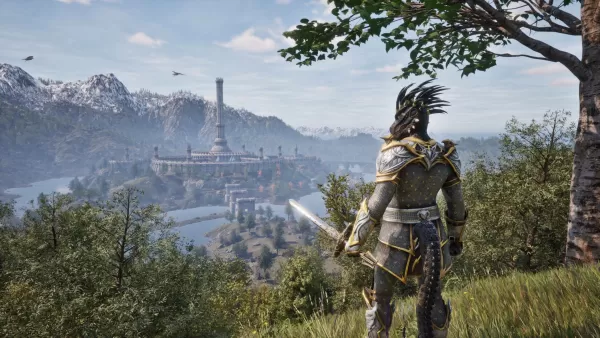By Azura, by Azura, by Azura – the rumors were true. Yesterday, Bethesda set the internet ablaze by finally unveiling Virtuos’ remaster of The Elder Scrolls IV: Oblivion. An 'Elder Scrolls Direct' event concluded with a surprise shadow-drop, instantly attracting hundreds of thousands of concurrent players. This moment of global excitement and celebration feels like a much-needed respite amid the recent challenges Bethesda Game Studios has faced. From years of damage control following Fallout 76's rocky launch to the lukewarm reception of Starfield, their latest releases have left many fans questioning: Has Bethesda lost its touch? The RPG landscape is now more competitive, with Larian Studios' Baldur’s Gate 3 and Obsidian’s The Outer Worlds series earning praise as spiritual successors to Elder Scrolls and Fallout. While Elder Scrolls 6 and Fallout 5 are years away from reclaiming their thrones, this re-release of Oblivion could be a step in the right direction, albeit an unexpected one.
At its zenith, Bethesda Game Studios was the titan of RPGs. In 2020, leaked Microsoft FTC documents revealed that Fallout 4 had sold 25 million units to date, with over 5 million sold in its first week alone, according to VGChartz. In 2023, Todd Howard announced that Skyrim had surpassed 60 million sales, though multiple re-releases undoubtedly played a role. Starfield, however, has only reached just over three million units a year-and-a-half after its launch. Considering Game Pass subscribers and the absence of a PlayStation version, this may still be a letdown for Bethesda. Despite a dedicated fanbase, Starfield's numbers pale in comparison to those of The Elder Scrolls or Fallout, and even its fans have expressed disappointment with the first expansion, Shattered Space.
This situation presents a significant challenge for the developer. With The Elder Scrolls 6 and Fallout 5 still distant dreams, how can this once-iconic RPG developer rekindle its fanbase's passion? The answer may lie in revisiting its past.
Rumors of the Elder Scrolls IV: Oblivion remaster surfaced in September 2023, when leaked Microsoft documents hinted at several unannounced Bethesda projects, including a remaster of the 2006 classic. The buzz quieted until January 2025, when a former Virtuos employee leaked further details, sparking debates among Elder Scrolls enthusiasts. The floodgates finally opened last week (albeit prematurely), igniting the internet – Google searches for 'The Elder Scrolls IV: Oblivion' soared to 6.4 million, a 713% increase in the last week alone. Bethesda's reveal livestream peaked at over half a million viewers. Despite the leaks, or perhaps because of them, over 600,000 people tuned in to see a 19-year-old game reintroduced. The demand to play the remaster was so intense it crashed discount game key websites like CDKeys and slowed down Fanatical and Green Man Gaming. As of yesterday, Steam reported 125,000 concurrent players, with the game firmly positioned as the #1 best seller. The fervor Bethesda fans have for Oblivion burns as brightly as the flames from the Oblivion gates.
The message from players is clear: if you (re)build it, they will come. What better way to keep fans engaged during these long development cycles than by inviting them to revisit the mysterious isles of Morrowind or the post-apocalyptic ruins of the East Coast? From a commercial perspective, this strategy makes perfect sense. While Bethesda's main team works on long-term projects, trusted partners like Virtuos can use existing blueprints to create remasters in shorter time frames. These remasters leverage games with established audiences and introduce many gamers to their first RPGs of their respective generations. Reviving these classics also draws in new players to explore Tamriel or the Fallout universe.
Bethesda has previously boosted its catalog effectively. During the first season of the Fallout TV show on Prime Video, Fallout 4 saw discounts of up to 75%, coupled with a next-gen update that included homages to the show. As a result, Fallout 4's sales in Europe surged by over 7,500% despite being nearly a decade old.
 Oblivion Remastered offers a visit to the past that looks like the future. Image credit: Bethesda / Virtuos
Oblivion Remastered offers a visit to the past that looks like the future. Image credit: Bethesda / Virtuos
Looking back at Microsoft's leaked Bethesda roadmap, many noted a planned Fallout 3 remaster following Oblivion two years later. Although the original timelines have shifted – Oblivion was initially slated for fiscal year 2022 – assuming these gaps remain, a Fallout 3 remake could be on the horizon for 2026, coinciding with Fallout Season 2. Given the second series' shift to New Vegas, could Bethesda be planning a surprise New Vegas remake? The synergy between the first season and Fallout 4's aesthetic suggests that Bethesda might elevate its strategy for the upcoming New Vegas-focused second season. Just as they shadow-dropped Oblivion, it's not beyond the realm of possibility that a New Vegas Remastered trailer awaits us at the end of Fallout Season 2's finale.
The message from players is clear: if you (re)build it, they will come. However, if there's one game in Bethesda's catalog that truly deserves a remake, it's The Elder Scrolls III: Morrowind. Many Elder Scrolls fans have long clamored for this, with some even using Skyrim's tools to recreate Morrowind, as seen in projects like Skyblivion. Yet, remaking Morrowind poses unique challenges. It stands at the crossroads of Bethesda's evolution, built differently from modern Elder Scrolls games. It's only partially voiced, relies heavily on text for storytelling, lacks quest markers, requiring players to note directions from NPCs, and has no combat physics. While Virtuos managed to update some of Oblivion's systems, Morrowind's very nature is a complex system. This complexity is why fans adore it, but also why it's difficult to remake. Remaking Morrowind walks a fine line: modernize too much and you risk losing its original charm; retain too many old systems, and it could feel outdated.
When a studio becomes the icon of a gaming genre, the challenge is to innovate while retaining its audience. Rockstar Games has kept Grand Theft Auto fans engaged for over a decade through the expanding world of GTA Online, which helps fund the rumored hefty budget for GTA 6. Bethesda's core strength lies in its richly detailed, expansive single-player worlds – Elder Scrolls Online and Fallout 76 don't quite capture the same magic. Yet, the overwhelming response to Virtuos' Oblivion remaster shows that gamers are eager to dive back into the historic worlds of Elder Scrolls. Not every remaster guarantees success – Rockstar's GTA Definitive Editions serve as a cautionary tale – but for Bethesda, reimagining its classic titles could be the key to recapturing its former glory in the modern RPG landscape.






